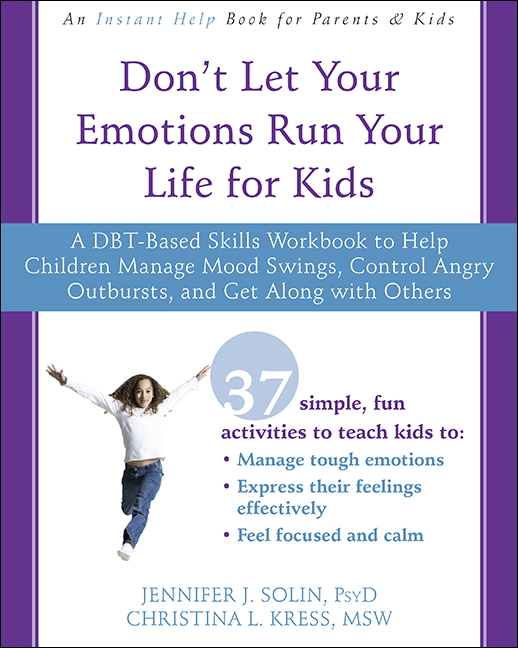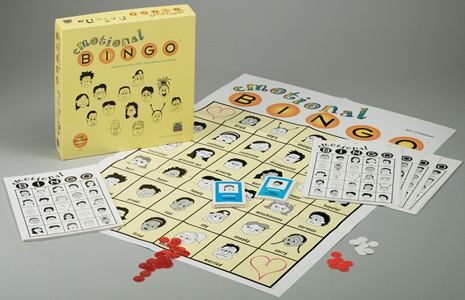Take charge of your emotions, take charge of your life! Now fully revised and updated, this workbook offers proven-effective dialectical behavior therapy (DBT) skills to help you find emotional balance and live the life you want.
Let’s face it: life gives you plenty of reasons to get angry, sad, scared, and frustrated—and those feelings are okay. But sometimes it can feel like your emotions are taking over, spinning out of control with a mind of their own. To make matters worse, these overwhelming emotions might be interfering with school, causing trouble in your relationships, and preventing you from reaching your goals and enjoying your teen years.
Now a teen self-help classic, Don’t Let Your Emotions Run Your Life for Teens has already helped thousands of teens take charge of their emotions using proven-effective dialectical behavior therapy (DBT) skills. This fully revised and updated second edition provides even more strategies for managing difficult feelings, and includes new information on how to accept your emotions, body-based practices for finding calm, and tips to help you identify the things in life that make you feel happy and fulfilled.
This book offers easy techniques to help you:
- Stay calm and mindful in times of crisis
- Effectively manage out-of-control emotions
- Reduce the pain of intense emotions
- Get along with family and friends
Contents
Introduction 1
Chapter One Mindfulness: Learning Self-Awareness 7
Activity 1. How Aware Are You of Your Thoughts? 11
Activity 2. How Unmindful Thoughts Can Trigger Painful Emotions 12
Activity 3. Mindfulness Breathing 13
Activity 4. Your Bucket of Emotions 18
Activity 5. How Do Your Emotions Feel? 20
Activity 6. Mindfulness to Physical Sensations 22
Activity 7. What Are Your Values? 25
Chapter Two What You Need to Know About Emotions 29
Activity 8. Put a Name on It 30
Activity 9. What’s This Emotion Telling You? 41
Activity 10. Thought, Emotion, or Behavior? 47
Activity 11. Sorting Out Your Thoughts, Emotions, and Behaviors 48
Activity 12. Observing Your Thoughts and Emotions 50
Chapter Three Taking Control of Out-of-Control Emotions 53
Activity 13. Reasoning, Emotional, or Wise Self? 57
Activity 14. Your Typical Way of Thinking 58
Activity 15. Lifestyle Changes You Can Make to Decrease Emotions 64
Activity 16. How to Be More Effective 69
Activity 17. Acting Opposite to Urges 76
Chapter Four Reducing Your Painful Emotions 79
Activity 18. Judgments vs. Nonjudgments 81
Activity 19. Adding Fuel to the Fire 84
Activity 20. Turning a Judgment Into a Nonjudgment 87
Activity 21. Changing Your Self-Judgments 90
Activity 22. Do You Validate or Invalidate Yourself? 92
Activity 23. What Messages Have You Received About Emotions? 94
Activity 24. Validating Yourself 96
Activity 25. What Does Fighting Reality Do for You? 98
Activity 26. How Reality Acceptance Helps 101
Activity 27. Loving-Kindness Meditation 104
Chapter Five Surviving a Crisis Without Making It Worse 107
Activity 28. How Do You Cope? 108
Activity 29. Distracting Yourself 114
Activity 30. Soothing Yourself 116
Activity 31. Creating a Crisis Plan 119
Chapter Six Improving Your Mood 123
Activity 32. Things You Enjoy 124
Activity 33. What Can You Do to Build Mastery? 128
Activity 34. Setting Goals for Yourself 130
Activity 35. Focusing on the Positive 134
Activity 36. Being Mindful to Your Emotions 137
Chapter Seven Improving Your Relationships 139
Activity 37. Thinking About Your Current Relationships 141
Activity 38. Increasing the Relationships in Your Life 145
Activity 39. What’s Your Communication Style? 151
Activity 40. Reflecting on Your Assertiveness Skills 157
Activity 41. Assertiveness Practice 160
Chapter Eight Putting It All Together 163
Activity 42. Self-Assessment 164
Activity 43. Your Experience of Willfulness and Willingness 169
Answers 171
Additional Reading 173
References 175
“Sheri Van Dijk has provided a delightful, must-read guide packed with important information for practitioners working with teens. Throughout, one can find practical, concrete, step-by step instructions that demystify the teenage emotional experience and offer practical tools. The numerous real-life vignettes validate the human experience and illustrate how to implement interventions to reduce painful emotions, which will resonate with clients and clinicians alike.”
—Ita Tobis, MSW, RSW, director of campus programming at JACS Toronto
“Don’t Let Your Emotions Run Your Life for Teens is a clear, concise, and helpful guide for teens. It offers tools to manage negative thoughts and feelings. Throughout this workbook you will find relatable exercises and techniques to help you regain control over your thoughts. Sheri Van Dijk has done it again! This workbook offers our teens the opportunity to practice their most needed skills in areas such as self-awareness, effective communication, and healthy relationships.”
—Stephen Cruickshank, CYC (Cert), child and youth worker in acute outpatient services at Royal Victoria Regional Health Centre, and child youth counselor for child and adolescent inpatient mental health at Southlake Regional Health Centre
“With a compassionate approach of validation, challenge, and acceptance, Van Dijk has developed a workbook for teens dealing with intense emotions. It is filled with relevant, insightful, and clearly illustrated concepts. The ongoing thought-provoking yet gentle questioning ensures the reader’s understanding. By including skill building exercises and activities that target thoughts, feelings, and behaviors, Van Dijk has created a wonderful, user-friendly, and concrete experience for teens.”
—Janice LeBlanc, registered psychotherapist, registered art therapist, and certified trauma and resilience practitioner
“Sheri’s new book teaches teens healthy ways of naming emotions, and the skills to move through distressing moments in their everyday experience. I love that the book is constructed in such a way that it can be used section by section, or one exercise at a time. The personal stories shared are very relevant to the current social environment experienced by youth, and the practice exercises are easy to follow.”
—Kinsey Lewis, registered psychotherapist with more than twenty-five years’ experience in community mental health with a special focus on transitional-age youth (16-24)
“Sheri Van Dijk is an expert in dialectical behavior therapy (DBT), and the second edition of Don’t Let Your Emotions Run Your Life for Teens is another significant tool for helping teens through the emotional ups and downs of both average adolescence and more critical situations. Van Dijk teaches effective skills couched in relatable teen language and scenarios, so readers don’t get lost or feel intimidated by professional jargon. Excellent resource!”
—Lisa M. Schab, LCSW, psychotherapist; and author of eighteen self-help books, including the teen journals, Put Your Worries Here and Put Your Feelings Here
“Don’t Let Your Emotions Run Your Life For Teens has been my number one go-to resource book for guiding teens toward exploring with respect and curiosity their emotions, perceptions, and the value of learning how to “Walk the Middle Path.” The DBT skills and worksheets are presented with exceptional clarity and relevance making the therapeutic work engaging and informative. A tremendous resource when navigating through the wonderful maze of our lives. Recommended for home, clinical, or personal use.”
—Mitchell E. Beube, MSW, RSW, child, family, individual, and DBT group therapist
“Don’t Let Your Emotions Run Your Life for Teens examines many areas that teenagers (and subsequently parents) struggle with. Sheri Van Dijk offers tangible tools to deal with emotional upheaval, volatile emotions, and difficult relationships. The exercises that Van Dijk includes in each chapter will assist teens by offering them options for coping with their emotions. Having raised three teenagers, I strongly believe these skills should be taught in schools as part of the curriculum!”
—Kathy Christie, ADR, mental health case manager at York Support Services Network in Newmarket, ON, Canada
“Van Dijk has written a workbook that any teen struggling with emotions will find very helpful. Using clear and concise language, this workbook offers awareness-enhancing exercises and practical help for recognizing, sorting out, and changing the way painful emotions can be handled. I found this book useful and easy to read, and I will recommend it to my teenage patients.”
—Mark R. Katz, MD, FRCOP(C), staff psychiatrist at the Southlake Regional Health Centre. and assistant professor at the University of Toronto
“I highly recommend this well-written, user-friendly workbook written especially for teens. It provides easy-to-use tools for harnessing unruly emotions and calming uncontrolled thinking. By following the suggestions in this workbook, teens will feel more capable of controlling their mood, have more harmonious relationships, gain confidence, and live happier lives.”
—Linda Jeffery, RN, cognitive behavior therapist in private practice in Newmarket, ON, Canada
“Emotions are generally undervalued in Western society. Many of us receive negative messages about emotions and come to experience them as worthless, problematic, or dangerous. However, emotions are powerful motivators and valid sources of knowledge. Van Dijk addresses these, and other important issues, in this book. She presents information about a range of emotional issues in an accessible manner. She also includes activities that will help deepen the reader’s understanding and integration of the material.”
—Karma Guindon, MSW, RSW, RMFT





